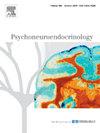Factors influencing length of hospital stay among psychiatric inpatients in Montreal, Canada: The role of insulin, IL-6 and TNF-Alpha
IF 3.6
2区 医学
Q2 ENDOCRINOLOGY & METABOLISM
引用次数: 0
Abstract
Hospital length of stay (LOS) is a widely used indicator of healthcare efficiency and a key metric for evaluating the performance of psychiatric services. This study aims to identify predisposing, needs-related, and enabling factors associated with LOS among patients with psychiatric disorders admitted through the psychiatric emergency room in Montreal, Canada. A total of 600 individuals with mental health disorders who were hospitalized between 2012 and 2018 were interviewed. Guided by the Behavioral Model for Vulnerable Populations, factors influencing LOS were assessed using a negative binomial regression model. Longer LOS was associated with patients aged 60 and older, those diagnosed with psychotic and/or personality disorders at admission, individuals with elevated interleukin-6 (IL-6) levels (a pro- and anti-inflammatory cytokine), and those with a history of hospitalization. In contrast, shorter LOS was observed among patients with common mental health symptoms, substance use disorders (SUD), suicidal ideation, among those with elevated levels of the pro-inflammatory cytokine tumor necrosis factor alpha (TNF-α) or insulin. Targeted interventions such as Assertive Community Treatment for patients with personality disorders, intensive home care for those with psychotic disorders, and crisis resolution teams for individuals experiencing suicidal ideation or common mental health symptoms may help reduce hospitalization durations. For patients with SUD, improved referral systems and harm reduction–oriented outpatient care are recommended. Circulating biomarkers such as IL-6, TNF-α, and insulin may aid in early identification of patients at risk for prolonged stays and hold promise for integration into clinical decision-making and treatment. Further research is needed to validate these findings across diverse psychiatric populations.
加拿大蒙特利尔精神病住院患者住院时间的影响因素:胰岛素、IL-6和tnf - α的作用
住院时间(LOS)是一项广泛使用的医疗效率指标,也是评估精神科服务绩效的关键指标。本研究旨在确定在加拿大蒙特利尔精神病急诊室就诊的精神疾病患者中与LOS相关的易感因素、需求相关因素和促成因素。在2012年至2018年期间,共有600名住院的精神健康障碍患者接受了采访。在弱势群体行为模型的指导下,采用负二项回归模型评估影响LOS的因素。较长的LOS与60岁及以上的患者、入院时被诊断为精神病和/或人格障碍的患者、白细胞介素-6 (IL-6)水平升高(一种促炎和抗炎细胞因子)和有住院史的患者相关。相比之下,在常见精神健康症状、物质使用障碍(SUD)、自杀意念、促炎细胞因子肿瘤坏死因子α (TNF-α)或胰岛素水平升高的患者中,观察到较短的LOS。有针对性的干预措施,如针对人格障碍患者的果断社区治疗,针对精神障碍患者的强化家庭护理,以及针对有自杀念头或常见精神健康症状的个人的危机解决小组,可能有助于减少住院时间。对于SUD患者,建议改善转诊系统和以减少危害为导向的门诊护理。循环生物标志物如IL-6、TNF-α和胰岛素可能有助于早期识别有延长住院风险的患者,并有望整合到临床决策和治疗中。需要进一步的研究在不同的精神病人群中验证这些发现。
本文章由计算机程序翻译,如有差异,请以英文原文为准。
求助全文
约1分钟内获得全文
求助全文
来源期刊

Psychoneuroendocrinology
医学-精神病学
CiteScore
7.40
自引率
8.10%
发文量
268
审稿时长
66 days
期刊介绍:
Psychoneuroendocrinology publishes papers dealing with the interrelated disciplines of psychology, neurobiology, endocrinology, immunology, neurology, and psychiatry, with an emphasis on multidisciplinary studies aiming at integrating these disciplines in terms of either basic research or clinical implications. One of the main goals is to understand how a variety of psychobiological factors interact in the expression of the stress response as it relates to the development and/or maintenance of neuropsychiatric illnesses.
 求助内容:
求助内容: 应助结果提醒方式:
应助结果提醒方式:


